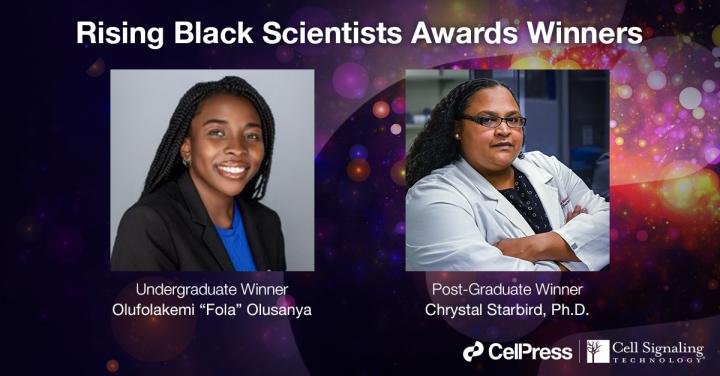
Credit: Cell Press
Essays from the winners of the Cell Press and Cell Signaling Technology (CST) Rising Black Scientists Awards appear February 18 in the journal Cell. The winners, undergraduate Olufolakemi “Fola” Olusanya (@fola_olusanya) of Howard University and postdoctoral fellow Chrystal Starbird (@drstarbird) of Yale University, write about their personal missions to create a more supportive future for the next generation of Black women scientists. The essays were selected from a pool of over 280 submissions by an academic advisory board of leading Black voices in the life science community and the Cell Press editorial team.
“Recognizing that success in science is driven not only by talent and motivation but also by access to a strong support network and opportunities, Cell Press and CST came together to create an opportunity to support innovative and driven young Black scientists on their career journeys,” says Anne Kitson, Managing Director, Cell Press and The Lancet. “We are honored to recognize these brilliant young women and look forward to supporting more inspiring Black scientists like them in the future.”
Undergraduate winner describes the science of Black womanhood
“Black womanhood is inherently scientific,” writes Olusanya in her essay, “Still we rise,” describing the “protocols” she learned in her mother’s kitchen and the chemistry it takes to nourish Black hair–as well as the crimes committed against Black women in the name of science.
Today, Olusanya is a senior at Howard University, where she is majoring in biology and minoring in chemistry and psychology. She currently works in the labs of Karl Thompson at Howard University and Maureen A. Carey at University of Virginia, but looks forward to pursuing her PhD in microbiology and intends to dedicate her research to studying the role of environmental racism in the structure of the human microbiome. “Once I’ve mastered all I can,” she writes in her essay, “I want to work to pass my science on to the next generation of young Black women.”
Post-graduate winner shares her fight to be heard
In Starbird’s essay, “Transforming myself and academia for good,” she writes, “Science was comforting. It was rational. It did not care if you were poor or rich, fat or thin, white or Black; the answers were the same for everyone.” She notes that once she made it to college, it quickly became clear that “the academic world of science was not logical,” and describes the challenges she has faced throughout her academic career to be heard, credited, and valued.
Starbird received her PhD in chemical and physical biology from Vanderbilt University and is currently completing her postdoctoral training in the lab of Kathryn Ferguson at Yale University. “It is my hope that in being honest about my experiences,” she says of her winning essay, “that upcoming scientists can see that they too can have a career in science, regardless of the obstacles they may face in their own lives, and that we all can work together to make the science that we love more equitable and accessible for all.”
Award winners selected based on personal voice and narrative quality
To be considered for the Awards, applicants were asked to submit an essay of 750 words or fewer sharing what inspires their science, the experiences that shaped their journey in the life sciences, and how they hope to contribute to a more inclusive scientific community.
The academic advisory board that selected the winning essays included Nicole Del Castillo, Director of the Office of Diversity, Equity, and Inclusion at Carver College of Medicine at the University of Iowa; Yvonne Fondufe-Mittendorf, Associate Professor in the Department of Molecular and Cellular Biochemistry at the University of Kentucky; W. Marcus Lambert, Assistant Dean of Diversity and Student Life and Assistant Professor of Education Research in Medicine at Weill Cornell Medicine; Courtney J. Robinson, Associate Professor in the Department of Biology at Howard University; and Jelani C. Zarif, an Assistant Professor of Oncology (Prostate Cancer Program) at the Johns Hopkins University School of Medicine’s Sidney Kimmel Comprehensive Cancer Center and a member of the Bloomberg-Kimmel Institute for Cancer Immunotherapy.
The Awards seek to break down barriers by providing funds to support professional development. In addition to publication in Cell, Olusanya and Starbird will also receive a $10,000 award and $1,000 in scientific materials from CST.
“Increasing representation serves both science and the human community,” said Michael J. Comb, PhD, President and Founder of Cell Signaling Technology. “We are thrilled and honored to be working with Cell Press to help enable talented, young, Black scientists to make positive impacts in their research careers. CST was founded over 20 years ago with the vision of providing tools to advance research and cure disease, so enabling access to science education and research opportunities is core to our mission. We hope and expect to see rapidly increasing diversity in science going forward.”
###
Cell, Olusanya, O.: “Still we rise”
https:/
Cell, Starbird, C.: “Transforming myself and academia for good”
https:/
Cell Press (@CellPressNews), an imprint of Elsevier, is a leading publisher of scientific research and reviews, with over 50 scientific journals across the life, physical, earth, and health sciences. We seek to support the scientific community and inspire future directions in research with our editorial excellence, commitment to innovation, unparalleled reach and visibility, and passion for advocacy. Visit http://www.
To receive Cell Press media alerts, contact [email protected].
Cell Signaling Technology (CST) is a private, family-owned company, founded by scientists and dedicated to providing high quality research tools to the biomedical research community. Our employees operate worldwide from our U.S. headquarters in Massachusetts, and our offices in the Netherlands, China, and Japan. Cell Signaling Technology® and CST™ are trademarks of Cell Signaling Technology, Inc.
Media Contact
Carly Britton
[email protected]




